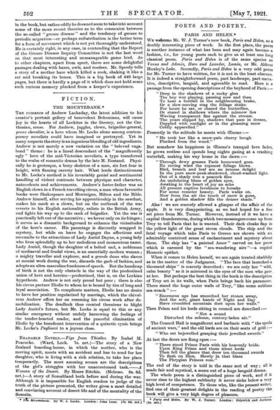FICTION.
THE MOTJNTEBANK.* THE romance of Andrew Lackaday, the latest addition to his creator's portrait gallery of benevolent Bohemians, will cause joy in the hearts of all Lockites in the literary, not the Car- thusian, sense. For Andrew, juggler, clown, brigadier-general, preux chevalier, is a hero whom Mr. Locke alone among contem- porary novelists could have imagined or portrayed. Yet in many respects the story is an ingenious blending of old ingredients. Andrew is not merely a new variation on the " beloved vaga- bond " theme : he is a lineal descendant of the " magnificently ugly " hero of the mid-Victorian novelists, a type transferred to the realm of romantic drama by the late M. Rostand. Physi- cally he is grotesque, a bony skeleton of a man, six feet four in height, with flaming carroty hair. What lends distinctiveness to Mr. Locke's method is his invariably genial and sentimental handling of violent contrasts between physique and character, antecedents and achievements. Andrew's foster-father was an English clown in a French travelling circus, a man whose favourite books were Shakespeare and Montaigne, Milton and the Bible. Andrew himself, after serving his apprenticeship in the sawdust, makes his mark as a clown, but on the outbreak of the war reverts to his English nationality, enlists in the British Army, and fights his way up to the rank of brigadier. Yet the war is practically left out of the narrative ; we hover only on its fringes ; it serves as a dramatic background to enhance the vicissitudes of the hero's career. His parentage is discreetly wrapped in mystery, but while on leave he engages the affections and succumbs to the attractions of Lady Auriol Dayne, a young lady who lives splendidly up to her melodious and momentous name. Lady Auriol, though the daughter of a belted earl, a nobleman of mediaeval and feudal views, is an essentially modem woman ; a mighty traveller and explorer, and a grande dame who slaves at menial work during the war, discards the garb of fashion, and adopts an ultra-masculine frankness of speech. But the handicap of birth is not the only obstacle in the way of the predestined union of hero and heroine—predestined, that is, on the Lockian hypothesis. Andrew is not only proud but poor ; there is also his circus partner Elodie to whom he is bound by ties of long and loyal association. To complicate matters, Elodie has no desire to have her position regularized by marriage, which the chival- rous Andrew offers her on resuming his circus work after de- mobilization. The deadlock thus created threatens to blight Lady Auriol's future, but Mr. Locke is equal to this or any similar emergency without unduly harrowing the feelings of the tender-hearted reader, and the peaceful elimination of Elodie by the beneficent intervention of a quixotic cynic brings Mr. Locke's Pagliacci to a joyous close.


































 Previous page
Previous page